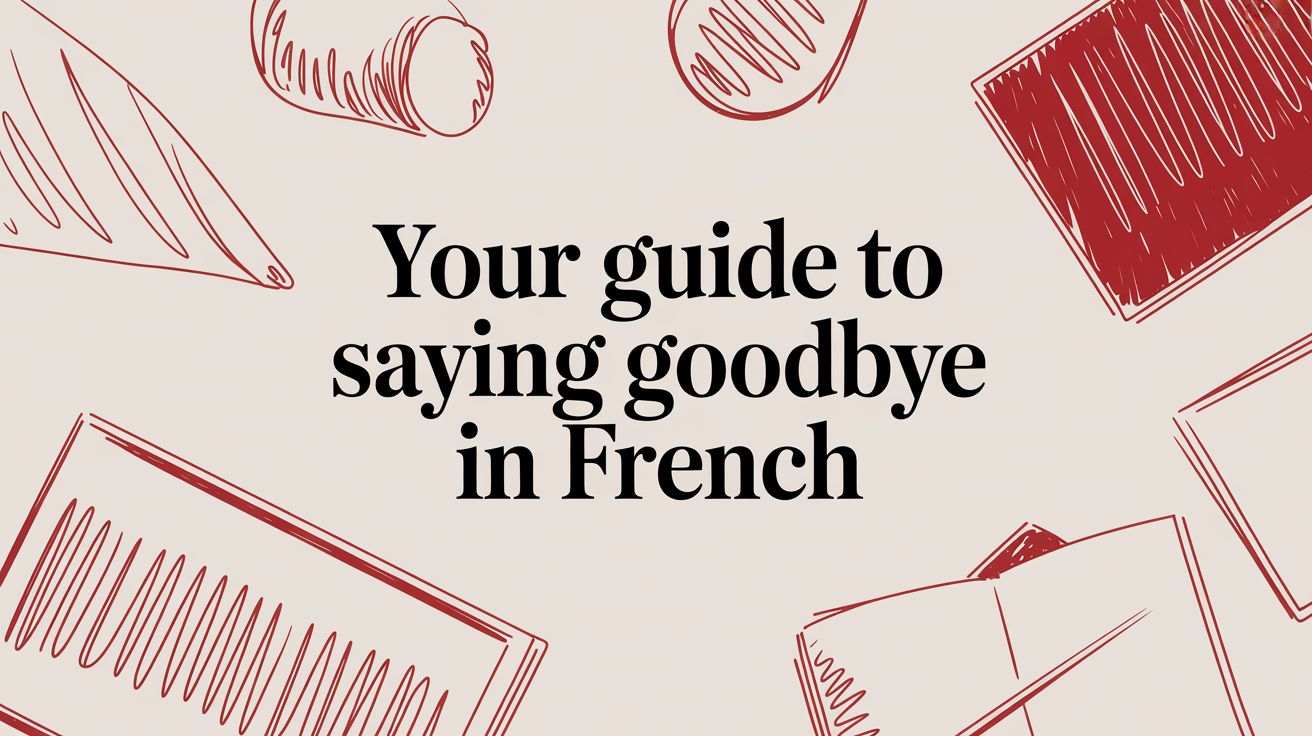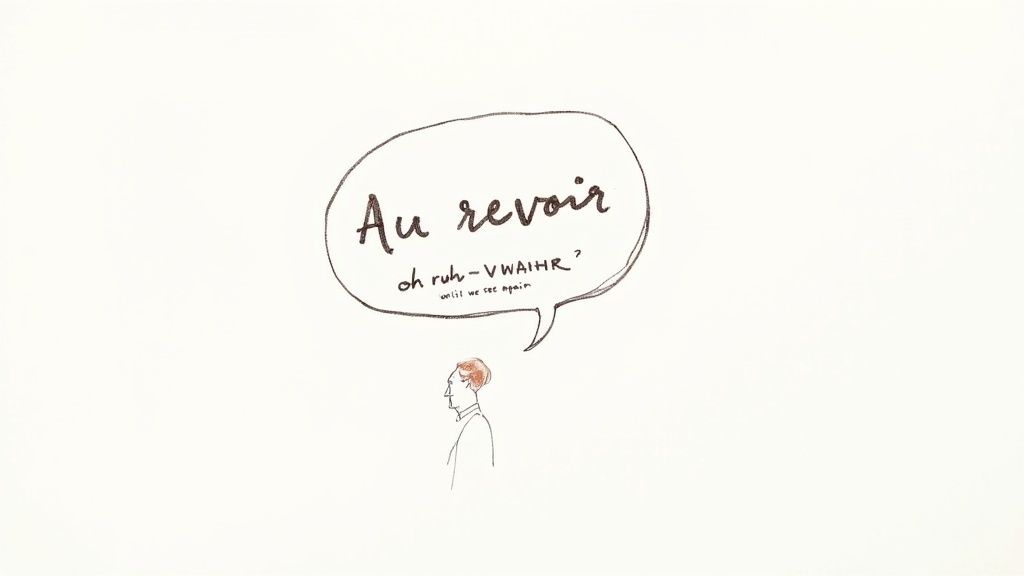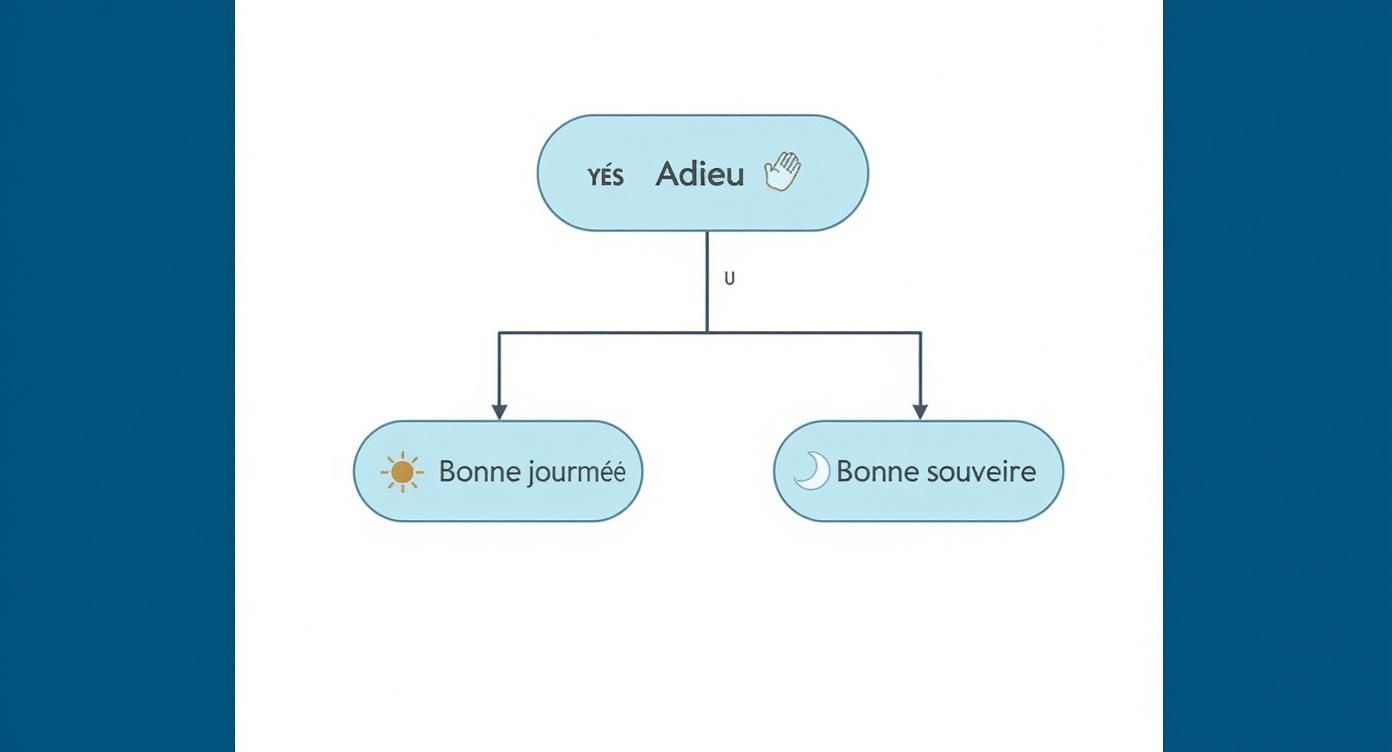Your Guide to Saying Goodbye in French
If you only learn one way to say goodbye in French, make it Au revoir. It's the classic, all-purpose farewell you can use in almost any situation without a second thought. Its literal meaning, ‘until we see again,’ makes it universally appropriate.
Getting to Grips With The Classic Au Revoir
While it's easy to just memorise Au revoir, taking a moment to understand its meaning reveals a lot about French culture. It’s not a final, definitive goodbye. Instead, it’s a warm and hopeful phrase that suggests you’ll cross paths again, a subtle but important part of French social etiquette.
Pronunciation is often the first hurdle for learners. Don't pronounce it as two separate words. Native speakers tend to glide them together into a single, fluid sound that’s closer to [orvwar]. Nailing this little detail will make you sound much more natural right from the start. Building a strong foundation is key, so if you're just starting out, our guide on the basic French language can help.
When Is Au Revoir The Right Choice?
Honestly, it’s hard to go wrong with Au revoir. It works just as well in formal, professional settings as it does in casual, everyday encounters, making it your safest bet.
You can confidently use Au revoir when you're:
- Leaving a bakery or a restaurant.
- Wrapping up a business meeting.
- Parting ways with someone you've just met.
- Saying goodbye to colleagues or friends.
In Singapore, fluency in French is still quite rare. A 2020 survey found that less than 0.5% of Singaporeans use French in their daily conversations. This means that mastering even a few key phrases like this one can really make you stand out.
The real beauty of "Au revoir" is in its hopeful spirit. It's not a door closing, but a gentle promise of a future hello, which is why it’s such a cornerstone of polite French interaction.
By really mastering this single phrase, you're giving yourself a powerful and versatile tool for navigating countless social situations, wherever in the French-speaking world you might find yourself.
To help you get started, here's a quick cheat sheet for some of the most common goodbyes you'll hear.
Quick Guide to French Goodbyes
| French Phrase | Pronunciation (Approximate) | Literal Meaning | When to Use It |
|---|---|---|---|
| Au revoir | or-vwar | Until we see again | The universal, all-purpose goodbye. Safe for any situation. |
| Salut | sa-loo | Hi / Bye | Very informal. Use only with close friends, family, and peers. |
| À bientôt | ah bee-en-toe | See you soon | A warm and friendly way to say you expect to see them again soon. |
| Bonne journée | bon zhoor-nay | Have a good day | A polite way to say goodbye to anyone during the daytime. |
| Adieu | ah-dyuh | To God | Very formal and final. Implies you'll never see the person again. |
This table should give you a good starting point for adding more variety to your farewells as you become more comfortable with the language.
Saying Goodbye The Formal French Way
In France, how you say goodbye in a formal setting—think business meetings, speaking with elders, or even just interacting with shopkeepers—really matters. It’s a sign of respect. While Au revoir is always a safe bet, knowing a few other options shows you've made an effort to understand the culture. It's the difference between a casual "Later!" and a more thoughtful "Have a wonderful day."
First, let's clear up a common misconception about the word Adieu. If you look it up, you'll see it translates literally to "to God." This isn't your everyday goodbye. Adieu carries a heavy, almost theatrical weight of finality, implying you'll never see the person again. Because of this, you’ll rarely hear it used in modern conversation. Save it for truly dramatic, life-altering farewells, otherwise, you might just get some very confused looks.
How to Choose The Right Polite Farewell
So, what should you use instead? The most natural and polite way to say goodbye in formal situations is to wish someone well for the rest of their day or evening. These expressions are incredibly common and perfect for wrapping up interactions with a touch of warmth.
Here are the two you'll use most often:
- Bonne journée (Have a good day): This is your go-to for any time before the evening hours. Perfect for leaving a shop, ending a morning meeting, or finishing a phone call.
- Bonne soirée (Have a good evening): Once it hits about 6 PM, switch over to this phrase. It’s the evening equivalent and just as common.
Think about it this way: when you pop into a boulangerie for your morning croissant, the baker will almost certainly send you off with a cheerful, "Au revoir, bonne journée!" It’s a small touch, but it’s a standard part of daily polite interactions.
Paying attention to the time of day and switching from journée to soirée is one of those little details that shows you're not just repeating phrases from a book. It signals that you're present and attuned to the social rhythm of the conversation.
Getting these nuances right is what separates a beginner from someone who truly gets the culture. By choosing the right formal goodbye, you’re doing more than just ending a conversation; you’re showing respect for French customs, which will make your interactions that much smoother and more genuine.
Getting Casual: Everyday French Goodbyes
Once you've got the formal stuff down, it's time to learn how the French really talk. Mastering casual goodbyes is your ticket to sounding less like a textbook and more like a local. These are the warm, relaxed phrases you'll swap with friends, family, and colleagues you know well. Think of it as the difference between a firm handshake and a friendly wave.
The undisputed champion of casual French is Salut. It's the ultimate multi-tool in your conversational kit, working for both "hello" and "bye." Just remember its informal vibe—it's perfect for pals, but you wouldn't use it with your new boss or an elderly person you've just met.
Another favourite, borrowed straight from Italian, is Ciao. You'll often see it spelt tchao in French texts, but it's used exactly like Salut for a quick, breezy sign-off.
Short and Sweet Ways to Say "See You"
What if you know you'll be seeing the person again soon? The French have some wonderfully efficient phrases for that, and you'll hear them everywhere.
- À plus tard (See you later): This is your go-to when you genuinely expect to see them again later the same day.
- À plus (Later!): This is the cooler, abbreviated version of À plus tard. It’s the French equivalent of texting "Laters!" and is incredibly common.
Nothing beats practising these phrases in a real conversation. If you're looking to build up your confidence, finding a language exchange in Singapore is a fantastic way to start talking with native speakers.
A brilliant phrase to have up your sleeve is À bientôt (See you soon). It’s a little softer than À plus tard because it doesn’t imply a specific time. It just carries a friendly, hopeful tone that you'll cross paths again, making it the perfect bridge between a formal Au revoir and a super-casual À plus.
For more formal situations, this quick decision tree can help you pick the right phrase every time.
As you can see, choosing between Bonne journée and Bonne soirée is all about the time of day. And Adieu? Save that one for truly permanent goodbyes.
Using Time-Specific French Farewells
Once you've got the basics down, you can add a wonderful layer of precision to your goodbyes by mentioning when you expect to see the person again. It’s a subtle but warm gesture that shows you’re already thinking about your next meeting. Think of it as the difference between a generic "bye" and a more personal "see you then."
For example, as you’re heading out of the office on a Friday, you wouldn't just say a simple goodbye. Instead, you might say, “À la semaine prochaine!” which means, “See you next week!” This small touch acknowledges your shared context and deepens the connection.
This simple logic can be applied to all sorts of situations, making your French sound much more natural and thoughtful.
Pinpointing Your Next Meeting
You can easily adapt your farewell for almost any future catch-up. This is incredibly common in everyday French conversation and, thankfully, it’s a breeze to learn. The structure is straightforward: just use the preposition à (meaning to/until) followed by a time reference.
Here are a few of the most useful variations you can start using right away:
- À demain (See you tomorrow): This is your go-to for colleagues, classmates, or friends you know you’ll be seeing the very next day.
- À lundi (See you on Monday): Perfect for wrapping up the work week. You can easily swap in any other day, like à mardi (Tuesday) or à jeudi (Thursday).
- À ce soir (See you tonight/this evening): Use this when you have plans to meet the same person again later that day.
Using these phrases shows you're not just translating words but actually thinking in a French context. It sends a signal that you're considering the future of your interaction, even if it's just for a coffee tomorrow.
By weaving these time-specific goodbyes into your vocabulary, you’ll move past the textbook basics and start communicating with real nuance and warmth.
Understanding French Farewell Etiquette
You’ve got the phrases down, but saying goodbye in French is about more than just the words you use. To truly connect with people, you need to get a feel for the cultural rituals that go along with a departure. It’s these unspoken gestures that transform a simple phrase into a warm, genuine interaction.
One of the most famous, and sometimes confusing, customs is la bise—the little air kiss on each cheek. It might feel a bit intimate at first if you’re not used to it, but it’s a completely standard way to say hello and goodbye to friends, family, and sometimes even new acquaintances in relaxed settings. In contrast, a formal handshake is usually saved for business situations or when you’re meeting someone new in a more official capacity.
Navigating La Bise and Other Customs
The unspoken rules of la bise can feel a bit like a dance, especially since they change from one region to another. In some parts of France, it’s two kisses. Head to another region, and you might find yourself giving three or even four! Don't stress about getting it wrong. The easiest way to handle it is to simply let the other person take the lead.
Beyond the kiss, a few other small gestures go a long way.
- Eye Contact: Looking someone in the eye as you say goodbye shows sincerity and that you're genuinely engaged in the moment.
- A Warm Smile: This one's universal. A real smile paired with any farewell phrase instantly makes it feel more friendly and personal.
- Body Language: If you're too far for a handshake or la bise, a simple nod or a friendly wave is the perfect companion to your spoken goodbye.
Think of these non-verbal signals as the social glue that makes the interaction feel complete and respectful.
The point of French farewell etiquette isn't to memorise a strict rulebook, but to convey warmth and respect. Whether you offer a handshake or lean in for a bise, the gesture is about acknowledging the other person and the connection you share.
This holds true even in global hubs like Singapore, where the French language has seen a surge in popularity. The local French community is the largest in Asia, and they've brought these charming customs with them. You can learn more about the growing interest in French in Singapore.
By pairing the right words with the right actions, you’ll leave behind a fantastic impression every time.
Common Questions About Saying Goodbye in French
It’s completely normal to feel a bit stuck when trying to pick the perfect French farewell. Getting a handle on these common trip-ups will give you the confidence to end conversations naturally, without second-guessing yourself. Let's clear up some of the most frequent questions learners have.
First up, is it rude to only say Au revoir? Not at all! Think of Au revoir as your trusty, go-to phrase. It's the Swiss Army knife of French goodbyes—it works in just about any situation, formal or informal, so you can never go wrong with it. If you’re ever unsure, it’s always a safe and respectful bet.
Clarifying Common Phrases
One of the trickiest spots for learners is telling the difference between À bientôt and À plus tard. They both translate to "see you later," but they carry slightly different feelings.
- À plus tard is for when you have a real plan to see the person again, usually later on the same day. It's more definite.
- À bientôt is more of a hopeful "see you soon." There’s no set time, which makes it a warm and friendly way to part with friends you hope to see again before too long.
What about the casual Salut? Can you slip that into a work email? The answer is a firm no. Salut is strictly for friends, family, and people you know well. Using it in a professional setting would come across as way too casual and even a bit unprofessional.
The real secret is realising that context is king. Picking the right goodbye in French is less about memorising words and more about reading the room and understanding your relationship with the other person.
If you want to get your ear tuned to the sounds of spoken French, using an AI audio translator can be a great help for practising pronunciation and catching those subtle differences. Getting these details right is what makes you sound less like a textbook and more like a local. For those who want to practise with a real person, taking dedicated classes for French can provide the structured feedback you need to really build your confidence.
At Spanish Council Singapore, we believe that mastering a language goes beyond just words. Our native teachers guide you through cultural nuances to help you communicate with confidence. Discover our engaging French courses today!















